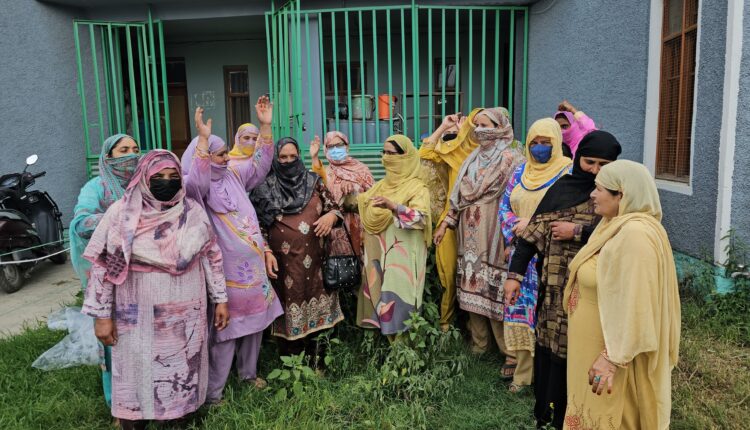Pampore MDM Cooks Protest Over Meagre Pay, Unpaid Wages
Bilal Habib
Pampore, Aug 9: Female Mid-Day Meal (MDM) cooks of the Education Department, Zone Pampore, on Friday staged a protest at the premises of the Zonal Education Office, demanding a hike in wages and clearance of pending salaries since September 2024.
The cooks, who currently receive only Rs 1,000 per month—equivalent to about Rs 33 per day—said the amount is grossly insufficient to survive, especially when they work daily from 9 a.m. to 3 p.m. preparing meals for schoolchildren. They appealed to Chief Minister Omar Abdullah and Education Minister Sakina Itoo to intervene, release pending wages, make them permanent employees, and fix their monthly pay between Rs 15,000 and Rs 20,000.
“If our demands are not met, we will stop cooking meals in schools,” said Dilshada, one of the protesting cooks. “We have been thrown aside like garbage, and no one listens to us. Either increase our salary or remove us from this job if we are not needed.”
The Jammu and Kashmir Teachers Forum (JKTF) Zone Pampore, led by Zonal President Bilal Ahmad Wani, extended full support to the cooks’ demands. Wani urged the government to increase their pay from Rs 1,000 to Rs 10,000 immediately and bring them under the Minimum Wages Act, which prescribes Rs 8,086–Rs 10,400 per month for unskilled and semi-skilled workers in J&K.
“This is not a salary—Rs 33 per day is less than what MGNREGA workers get, and far below daily earnings of other labourers,” Wani told Kashmir Convener. “We demand a minimum salary of Rs 15,000 per month for cooks and helpers.” He said the Teachers Forum has already taken up the matter with CM Omar Abdullah, Education Minister Sakina Itoo, and senior officials.
Zonal Education Officer Pampore assured the protesting cooks of full support and promised to take up their grievances with higher authorities to find a timely resolution.
The protest has once again brought to the fore the plight of Mid-Day Meal workers in J&K, who remain among the lowest-paid staff in the education sector despite playing a crucial role in school nutrition programmes.


Comments are closed.